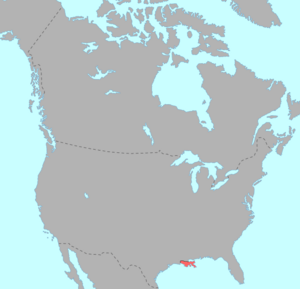Aboriginal title in Louisiana facts for kids
The United States Court of Appeals for the Fifth Circuit has ruled that there is no aboriginal title in Louisiana. Aboriginal title refers to the special rights that Indigenous peoples have to their traditional lands. This ruling means that Native American tribes in Louisiana do not have a legal claim to their ancestral lands based on their original ownership.
Contents
History of Land Claims in Louisiana
Early European Control
For a long time, different European countries controlled the land that is now Louisiana. This history is important for understanding land claims.
Spanish Rule and Land Rights
When Spain governed Louisiana, its laws said that Native American tribes could not sell their lands without the Governor's approval. This was meant to protect their land rights.
French Control and the Louisiana Purchase
In 1800, Spain gave Louisiana back to France. Then, in 1803, the United States bought a huge area of land, including Louisiana, from France. This famous deal was called the Louisiana Purchase.
U.S. Takes Over Louisiana
After the purchase, the U.S. government created the Louisiana Territory in 1804. A law passed that year said that any land deals made by Spain during a confusing time were "null, void, and of no effect." This meant those deals were not legally valid.
Louisiana Becomes a State
Louisiana officially became a state in 1812.
Louisiana Land Claims Act
The "Louisiana Land Claims Act" is a name for several U.S. federal laws passed between 1805 and 1844. These laws dealt with who owned land in Louisiana.
How the Land Claims Act Worked
The first act, from 1805, told people who had unclear or incomplete land claims to file them with a special group called the Board of Land Commissioners. If they didn't file their claims, they would lose their right to the land forever. People with clear, complete ownership didn't have to file, but they could if they wanted to.
Later acts extended the deadline for filing claims. In 1816, a report called the "Opelousas Report" said that a law called the Nonintercourse Act (which usually applied to land sales from Native Americans) did not apply to land bought from Native Americans under Spanish and French rule. Instead, Spanish and French laws applied. Congress agreed with this report.
Chitimacha Tribe of Louisiana v. Harry L. Laws Co. (1982)

This important court case involved the Chitimacha Tribe of Louisiana.
The Chitimacha Tribe's Lawsuit
In 1977, the Chitimacha Tribe sued in a U.S. court in Louisiana. They claimed a large area of land in St. Mary Parish, Louisiana. The tribe said that this land was sold from them in the late 1700s. They argued these sales broke the Nonintercourse Act. This act generally requires U.S. government approval for land sales from Native American tribes.
The three sales happened when Spain ruled Louisiana. They involved land sold to Phillip Verret in 1794, Frederick Pellerin in 1794, and Marie Joseph in 1799. Many landowners were named as defendants in the lawsuit. The judge, W. Eugene Davis, ruled in favor of the landowners without a full trial.
The Appeal and the Fifth Circuit's Decision
The Chitimacha Tribe appealed the decision. They argued that the judge should not have heard the case. They also said his ruling was wrong.
The United States Court of Appeals for the Fifth Circuit upheld the original decision. The Fifth Circuit said that the Louisiana Land Claims Acts applied to aboriginal title. This meant the Chitimacha Tribe should have filed their land claim with the Commission. Since they did not, their land rights were lost.
The court assumed that the original sales might have broken Spanish law because they didn't have the Governor's permission. However, the people who bought the land (or their descendants) had filed their claims under the Louisiana Land Claims Act, and their claims were approved.
Comparing Land Claim Laws
The Fifth Circuit compared the Louisiana laws to similar laws for California. They found them "very similar." However, they said the case was different from United States v. Santa Fe Pac. R.R. (1941). That case involved laws for Arizona and New Mexico that did not require filing claims or have a rule about losing rights if claims weren't filed.
The Fifth Circuit also said the Chitimacha Tribe had "incomplete title." This means their ownership was not fully valid until the U.S. government confirmed it. The court did not say all aboriginal title was incomplete. But they said the Chitimacha's title was incomplete because they had sold the land and no longer had possession of it.
See Also
 | William L. Dawson |
 | W. E. B. Du Bois |
 | Harry Belafonte |

